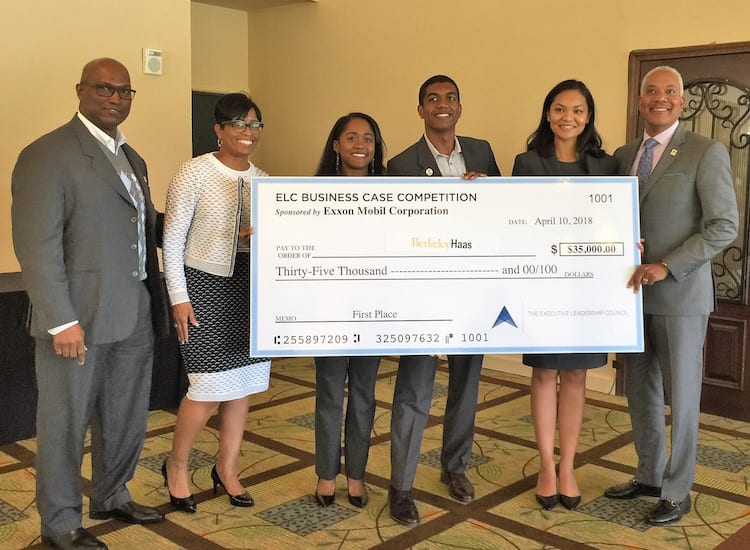
A team from University of California, Berkeley’s Haas School of Business took first place at The Executive Leadership Council’s (ELC) National Business Case Competition for their strategy to help a Fortune 100 company promote and retain more black leaders.
The winning team members are Breona (Bree) Jenkins, MBA 19; Andrew Briggs, MBA 19; and, Erin Gums, MBA 18.
The annual case competition, sponsored and hosted by ExxonMobil Corporation April 9-10 in The Woodlands, Tx., invites students from the nation’s top business schools to form teams. The teams are asked to analyze a timely business issue in a way that demonstrates critical thinking and analytical and communication skills.
This year’s case, “How to Stop the Diversity Pipeline Leak: Averting a Leadership Crisis,” called on each team to develop a corporate strategy with a communications plan, strong financial analysis, and key measurable metrics.
Pivoting quickly
Gums, who served as the VP of Diversity for the MBA Association, said once the team made it to the finals, they had just over a week to pull together a unique and polished presentation, with extensive input from professionals who have worked in leadership for decades.
The day before they pitched, they talked to senior leaders from ExxonMobil and the Executive Leadership Council, who highlighted many of the challenges they were facing.
“We had to pivot quickly to incorporate some of the ideas that were top of mind for our audience, and had to strike the right balance between delivering an executive-level strategy and including enough detail on implementation,” she said. “The judges asked us some tough questions, but we responded thoughtfully as a team.”
Jenkins, who served as team captain and leads the Haas chapter of the Consortium for Graduate Study in Management, said the team members are not only friends but are all Consortium fellows, who bonded over a shared commitment to increasing underrepresented minority representation in business.
“We already had some experience in the daunting challenge presented by the case, and we were able to quickly identify and prioritize the root-causes of the problem,” she said.
The team applied the concept of human-centered design from their Problem Finding, Problem Solving course at Haas to develop and structure their content. “We interviewed faculty and friends to get their perspectives on the problem, generated a lot of interesting ideas, and created a database to store these ideas, prototyped, tested, and finally shared our solutions,” Jenkins said.
Using other companies as a model
The team also built a playbook to help Fortune 500 companies replicate proven talent retention initiatives, modeled after best practices at companies including Accenture, Google, Intel, Nestle, and Wells Fargo, said Briggs , who co-leads a student-led venture capital fund.
“We demonstrated how design thinking can humanize and reshape initiatives based on context, how collaboration technologies can deliver quick-wins, and how new metrics and incentives can improve overall impact,” he said
The winning Haas team received a cash award of $35,000. Duke’s Fuqua School of Business took second place, and Howard University’s team snagged third place.
The Berkeley Haas team delivered a strong and compelling case, said Skip Spriggs, president and CEO of The Executive Leadership Council, a non-profit focused on increasing the number of C-suite black executives.
“All of the teams did an excellent job of identifying and offering effective ways to retain diverse talent in the leadership pipeline for succession planning,” said JoAnn Lee, assistant general counsel for ExxonMobil. “ExxonMobil is proud to recognize these future business leaders for their great work and creativity.”
In addition to the cash award, the Haas team will be introduced at The Executive Leadership Council’s Annual Recognition Gala in Washington, DC in October 2018, attended by more than 2,000 leaders in business, public affairs, education, and the arts.